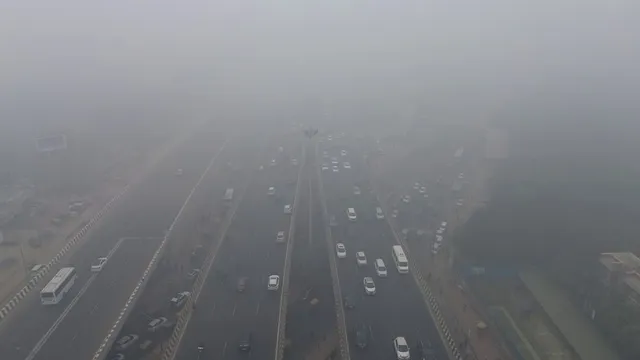- By Nidhi Giri
- Tue, 19 Nov 2024 08:44 AM (IST)
- Source:JND
Delhi Air Pollution: Air quality in multiple areas across Delhi, Noida, Ghaziabad and Gurugram reached “alarmingly high” levels with most AQI stations crossing 500-mark (severe plus) on November 19, prompting concerns about health and safety. According to AQI.IN, the AQI in Delhi’s Jahangirpuri and Alipur were recorded 1036 and 1091, respectively, at 7 am on Tuesday as the NCR region continues to choke under toxic blend of smog and fog for the seventh consecutive day, jagran.com reported
#WATCH | Delhi: Kartavya Path and surrounding areas covered in a layer of smog as air quality in the city remains in 'Severe' category, as per Central Pollution Control Board. pic.twitter.com/80mK0nCkBq
— ANI (@ANI) November 19, 2024
READ MORE: Gujarat: 15 Seniors Booked After First-Year MBBS Student Dies Of Alleged Ragging In Patan
According to AQI.IN, AQI Levels At 7 am On Tuesday
Jahangirpuri Delhi | 1036 |
Alipur Delhi | 1019 |
Narela New Delhi | 918 |
Punjabi Bagh Delhi | 840 |
ITI Sharda Delhi | 878 |
Sonia Vihar Delhi | 721 |
Loni New Delhi | 629 |
Noida Sector-1 | 247 |
Delhi Air Pollution: Top Updates
1. Flights and trains delayed: Due to dense fog over the national capital region over the past few days, six flights were delayed between Pune and other north Indian cities, including Delhi, The Times of India reported on Monday. Meanwhile, train services continued, with visuals from New Delhi Railway Station showing a thick haze enveloping the area. Due to the reduced visibility, 22 trains have been delayed and 9 rescheduled, according to the Railways.
2. Delhi University, in a notification, said regular classes in “physical mode” will resume on November 25. Jawaharlal Nehru University (JNU), in its statement, said it would conduct all classes online till November 22. The schedule of exams and interviews, however, remains unchanged, the universities said.
3. The Delhi government has termed the air situation a “medical emergency” and urged institutions to take preventive measures in the interest of public health. The two major factors affecting the city's air are weather conditions and stubble burning.
4. Several schools and colleges in the region have already started shifting to online classes due to the poor air. In-person classes will be suspended for classes 10 and 12, the Delhi government announced on Monday.
5. "From tomorrow physical classes shall be suspended for Class 10 and 12 as well, and all studies will be shifted online," Delhi chief minister Atishi said in a post on X.
6. The directorate of education, too, issued a circular directing the heads of government and private schools to discontinue the classes for all students, including classes 10 and 12.
7. The Union health secretary's advisory includes recommendations for states and UTs to strengthen existing health systems and raise awareness among vulnerable groups and at-risk occupations. The advisory suggests developing detailed action plans at the district and city levels to address climate change's health impacts, including strategies to combat air pollution.
8. It also emphasises expanding the network of sentinel hospitals to monitor air pollution-related illnesses within each state or union territory for effective response and monitoring.
9. With the AQI entering into the ‘severe plus’ category choking the national capital, the Supreme Court on Monday directed all Delhi-NCR states to immediately set up teams to strictly enforce anti-pollution Graded Response Action Plan-4 (GRAP) restrictions, making it clear that the curbs will continue till further orders. The court asserted that it is the constitutional duty of all states to ensure all citizens live in a pollution-free environment.
10. The Supreme Court also pulled up the Commission for Air Quality Management (CAQM) for “delaying” the implementation of Graded Response Action Plan (GRAP) and said it followed a “wrong” approach.

